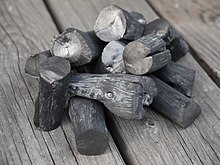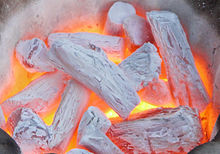

Binchō-tan (Japanese: 備長炭, [biɲtɕoꜜːtaɴ]), also called white charcoal or binchō-zumi, is a type of high-quality charcoal traditionally used in Japanese cooking. Its use dates back to the Edo period when during the Genroku era, a craftsman named Bichū-ya Chōzaemon (備中屋 長左衛門) began to produce it in Tanabe, Wakayama. The typical raw material used to make binchō-tan in Japan is oak, specifically ubame oak [ja], now the official tree of Wakayama Prefecture. Wakayama continues to be a major producer of high-quality charcoal, with the town of Minabe, Wakayama, producing more binchō-tan than any other town in Japan. Binchō-tan produced in Wakayama is referred to as Kishū binchō-tan (紀州備長炭), Kishū being the old name of Wakayama.
White charcoal is made by pyrolysing wood in a kiln at approximately 240 °C (464 °F) for 120 hours, then raising the temperature to around 1,000 °C (1,830 °F). Once carbonised, the material is taken out and covered to cure in a damp mixture of earth, sand, and ash.
Binchō-tan is a type of hardwood charcoal which takes the natural shape of the wood that was used to make it. It is also harder than black charcoal, ringing with a metallic sound when struck. Due to its physical structure, binchō-tan takes on a whiter or even metallic appearance. Apart from being used for cooking, it has other benefits, such as absorption of odors.
References
- Chia, C. H.; Munroe, P.; Joseph, S. D. (2012). "Microstructural Characterization of White Charcoal". Journal of Analytical & Applied Pyrolysis. 18 (S2): 1562. Bibcode:2012MiMic..18S1562C. doi:10.1017/S143192761200966X. hdl:11858/00-001M-0000-0019-DC11-C. S2CID 137383274. Retrieved 29 April 2020.
External links
- 紀州備長炭 —Making of Kishū Binchōtan by Wakayama Pref.
- 炭琴 —Tankin ("charcoal-xylophone")
- "Charcoal Adds to the Good Life" – an article from 2001 touting the benefits of black and white charcoal, the latter including binchōtan